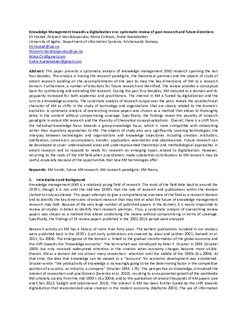| dc.description.abstract | This paper presents a systematic analysis of knowledge management (KM) research spanning the last four decades. The analysis is tracing the research paradigms, the theoretical premises and the objects of study of extant research building on the accomplishments of the past to map the key dimensions of KM as a research domain. Furthermore, a number of directions for future research are identified. The review provides a conceptual basis for synthesizing and extending KM research. During the past four decades, KM matured as a domain and its popularity increased for both academics and practitioners. The interest in KM is fueled by digitalization and the turn to a knowledge economy. The systematic analysis of research output over the years reveals the sociotechnical character of KM as shifts in the study of technology and organizations that are closely related to the domain´s evolution. A systematic analysis of overarching review papers was chosen as a method that allows to thoroughly delve in the content without compromising coverage.
Specifically, the findings reveal the plurality of research
paradigms in extant KM research and the diversity of theoretical conceptualizations. Overall, there is a shift from the individual‐knowledge focus towards a group‐knowledge focus, which is more compatible with networking rather than repository approaches to KM. The objects of study also vary significantly covering technologies, the interplay between technologies and organizations and knowledge trajectories including creation, elicitation, codification, conversion, accumulation, transfer, application, valorization and obsolescence. Future research can be developed to cover underexplored areas and underrepresented theoretical and methodological approaches in
extant research and to respond to needs for research on emerging topics related to digitalization. However,
returning to the roots of the KM field when practitioners made substantial contributions to KM research may be useful, especially because of the opportunities that new KM technologies offer. | |
